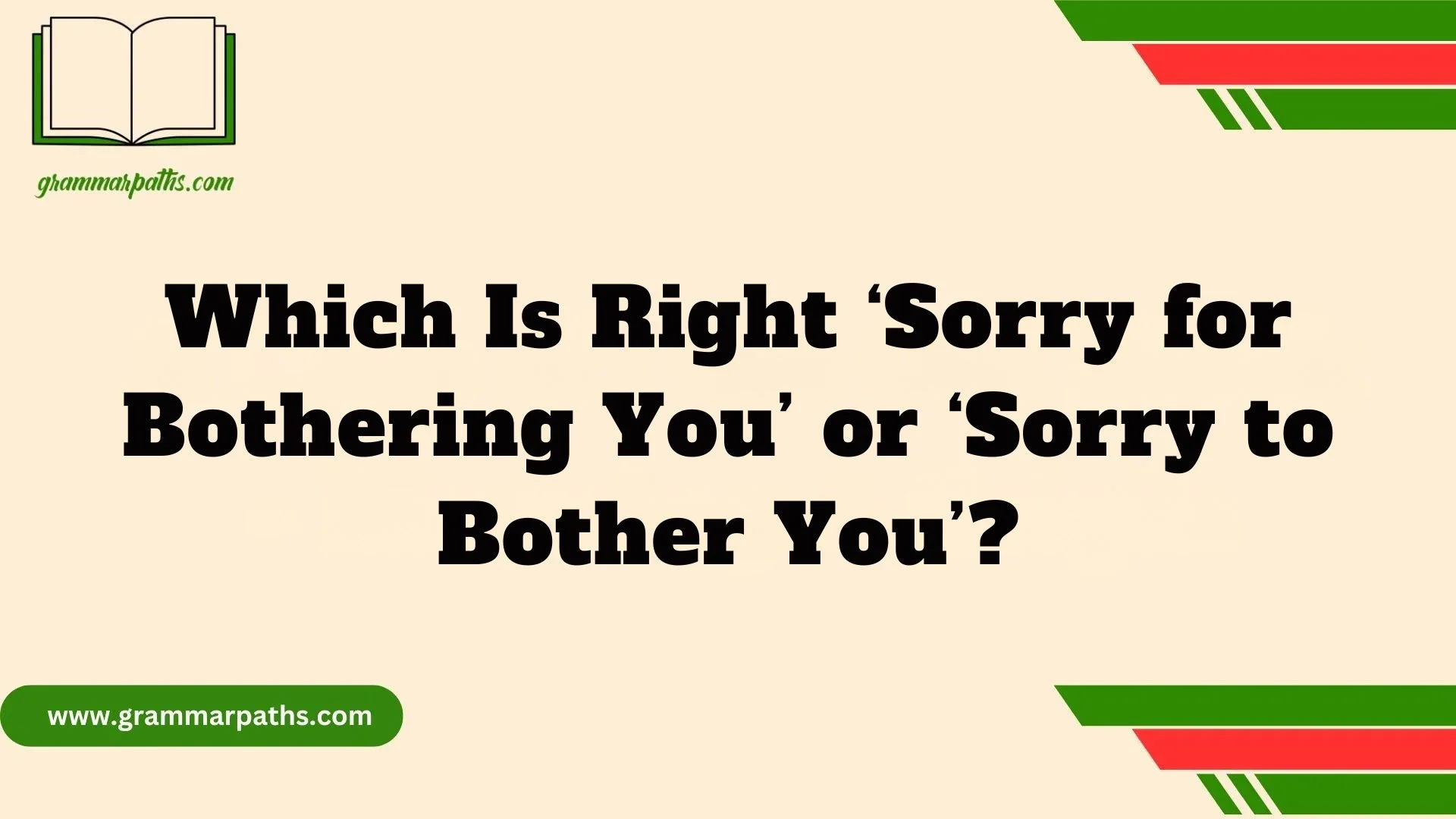When I’m writing a message to a manager, a colleague, or someone from outside the company, I pay close attention to tone—because in most cases, people react first to how something feels rather than what it says. This is why phrases like “sorry to bother you” or “sorry for bothering you” matter so much. They help shape the emotional tone and create the right impression, especially in professional communication. Even a small grammar difference carries major impact when used in customer support, team emails, or formal settings. The question of “Which Is Right: ‘Sorry for Bothering You’ or ‘Sorry to Bother You’?” may seem minor, but it affects how your words are seen, and how respectful or confident you sound.
In my experience with team communication, “sorry to bother you” fits naturally at the beginning of a request, while “sorry for bothering you” feels more appropriate after the action is done. That small context shift actually helps smooth over awkward exchanges and even builds trust with clients or coworkers. When used thoughtfully and at the right time, these phrases not only prevent friction but also show that you’re emotionally aware and truly respectful. It’s these subtle but powerful phrases that help professionals be seen as clear, warm, and emotionally intelligent. Understanding when and how to use each gives your words strength, and in a world where first impressions matter, they’re essential.
Why Do We Say “Sorry to Bother You”?
Language is a powerful tool, and often, we use small phrases to keep social harmony. The phrase “Sorry to bother you” signals respect and acknowledges that you might be interrupting someone.
Think about it: when you say this, you’re showing awareness of the other person’s time and space. It’s like knocking before entering a room. But why are there two versions of this phrase? And do they mean the same thing?
At first glance, “Sorry to bother you” and “Sorry for bothering you” seem interchangeable. Yet they serve slightly different purposes. This post explains those differences clearly, helping you use them with precision.
What’s the Difference? “Sorry To Bother You” vs. “Sorry For Bothering You”
The main difference lies in grammar and timing.
| Phrase | Grammar Structure | Typical Usage | Tone |
| Sorry to bother you | Infinitive (to + verb) | Before interrupting or making a request | Immediate, polite |
| Sorry for bothering you | Gerund (verb + -ing) | After an interruption or to apologize retrospectively | Reflective, sometimes more formal |
“Sorry to bother you” is like saying, “I’m about to interrupt, please forgive me.” You use it right before making your request. For example:
“Sorry to bother you, but can I ask a quick question?”
On the other hand, “Sorry for bothering you” often follows the event:
“Sorry for bothering you earlier; I didn’t mean to interrupt your work.”
While both convey politeness, the infinitive form is more common in everyday use, especially in business emails or quick interactions.
Why Tone and Context Matter in Apologies
Apologies do more than just say “sorry.” They help maintain relationships, show empathy, and smooth social interactions. However, too many apologies can backfire. Over-apologizing may make you appear less confident or even annoy your audience.
The Psychology of Apologies
- Positive effect: Builds rapport, reduces tension.
- Negative effect: Frequent apologies can suggest insecurity or lack of authority.
In written communication, tone can be tricky to convey. Without vocal cues, a polite apology might sound insincere or robotic.
Emotional intelligence helps you balance sincerity and confidence. It’s about knowing when to apologize and when to express gratitude instead.
Professional Communication: Email, Chat, and Office Etiquette
In the workplace, your opening sentence often sets the tone for the entire conversation. Using “sorry to bother you” correctly can signal respect but must be handled carefully.
When to Use “Sorry to Bother You” in Business Writing
- When reaching out to someone with a higher position
- When interrupting a busy colleague or client
- To politely introduce a request or question
Phrases to Avoid That Weaken Your Authority
- Over-apologizing: “Sorry to bother you again…” repeated often
- Vague apologies: “I’m sorry if this is inconvenient” (sounds unsure)
- Unnecessary apologies: Apologizing for things out of your control
Polite Request Templates
| Situation | Polite Opener | Example Sentence |
| Email to manager or executive | “Sorry to bother you, but…” | “Sorry to bother you, but could you review the report by tomorrow?” |
| Client communication | “I hope this isn’t a bad time…” | “I hope this isn’t a bad time, but I wanted to clarify the invoice details.” |
| Workplace messaging (Slack, Teams) | “Quick question for you…” | “Quick question for you: have you seen the updated schedule?” |
Formality Spectrum: Adjusting Apologies Based on Your Relationship
Not every apology should sound the same. The level of formality depends on your relationship with the person and the setting.
| Recipient | Example Phrase | Tone |
| Boss or professor | “Sorry to bother you, Dr. Smith, but I have a question.” | Formal |
| Colleague or peer | “Hey, sorry to bug you—need your input on this.” | Semi-formal |
| Friend or acquaintance | “Sorry for bothering you earlier, just wanted to check in.” | Informal |
This spectrum helps you navigate professional boundaries while keeping communication smooth.
Top Polite Alternatives to “Sorry to Bother You”
Sometimes, saying “sorry” isn’t necessary. There are alternatives that politely acknowledge the interruption without overdoing the apology.
Respectful Alternatives
- “I hope this isn’t a bad time…”
- “Would you mind if I…”
- “I just wanted to quickly check in…”
- “When you have a moment, could you…”
| Phrase | When to Use | Pros | Cons |
| I hope this isn’t a bad time… | Busy professionals, formal emails | Polite, less apologetic | May sound hesitant if overused |
| Would you mind if I… | Before requests | Respectful and empowering | Might seem too formal in casual |
| I just wanted to quickly check in… | Follow-up emails | Friendly and clear | Not ideal for urgent matters |
Friendly and Casual Alternatives (Without Sounding Pushy)
When chatting informally or texting, you want to sound natural but still respectful.
- “Quick question for you…”
- “Got a sec?”
- “Can I run something by you?”
- “Hey, do you mind if I ask…”
These phrases keep things light but maintain respect for the other person’s time.
Sincerity Without Over-Apologizing
Over-apologizing is a common trap, especially among women and junior employees. It can reduce your perceived confidence and authority.
Better Strategies Include
- Expressing gratitude instead of regret:
- “Thanks for your time on this.”
- “I appreciate your help.”
- Using direct yet polite requests:
- “Could you please…”
- Limiting “sorry” to moments of real fault or inconvenience.
How Cultural Norms Influence Apologies
Apologies don’t mean the same thing everywhere. Understanding cultural differences is essential, especially in global business.
| Culture | Apology Norms | Tips for Communication |
| Japan | Frequent, formal apologies signal respect | Use formal apologies and honorifics |
| United States | Politeness balanced with assertiveness | Avoid over-apologizing; be clear and direct |
| Germany | Direct communication, less frequent apologies | Save apologies for genuine mistakes |
Case Study: In Japan, employees often apologize repeatedly during meetings, signaling respect. In the U.S., too many apologies can be seen as weakness or insecurity. Adapting your language avoids misunderstandings.
Visual Guide: Apology Phrases by Tone & Context
Here’s a quick chart to help you pick the right phrase:
| Formality ↓ / Directness → | High Directness | Medium Directness | Low Directness |
| High Formality | Sorry to bother you, but… | I hope this isn’t a bad time… | When convenient, could you… |
| Medium Formality | Quick question for you… | Would you mind if I… | Just wanted to check in… |
| Low Formality | Got a sec? | Can I run something by you? | Hey, do you mind if I ask… |
Common Mistakes to Avoid
- Using insincere, scripted lines can sound robotic.
- Saying sorry for things out of your control dilutes your message.
- Apologizing instead of clearly stating your purpose wastes time.
Example
Weak:
“Sorry to bother you, but I just wanted to check if maybe you had some time possibly to look at the report.”
Strong:
“Could you please review the report when you have a moment? Thank you.”
Final Tips: Writing and Speaking With Confidence and Courtesy
- Use respect and clarity instead of defaulting to “sorry.”
- Only apologize when necessary; otherwise, use gratitude or polite requests.
- Keep sentences short and direct to sound natural.
- End your messages politely but confidently:
- “Thanks for your time!”
- “Looking forward to your feedback.”
Conclusion: Apologize Less, Connect More
In short, the difference between “Sorry for Bothering You” and “Sorry to Bother You” is more than just grammar—it’s about timing, tone, and emotional awareness. One fits before a request, the other fits after an action. When used right, these phrases help you come across as thoughtful and polite. They’re small words, but they carry big weight in professional communication. Whether you’re writing a quick email or a formal message, knowing which one to use helps you sound more respectful, confident, and human.
FAQs
1. Is “Sorry to Bother You” more formal than “Sorry for Bothering You”?
No, not exactly. Both are polite, but “Sorry to Bother You” sounds more proactive and is better used before making a request. “Sorry for Bothering You” works better after the interruption has already happened.
2. Can I use either phrase in professional emails?
Yes, you can. Just pay attention to the timing. Use “Sorry to Bother You” if you’re about to ask for something. Use “Sorry for Bothering You” if you already did and want to apologize gently.
3. Are these phrases appropriate for customer service or client communication?
Absolutely. In customer support, these expressions show empathy and help keep the tone soft and polite, especially when dealing with awkward situations or follow-ups.
4. What’s a more casual way to say the same thing?
You could say, “Hope I’m not interrupting,” or “Just a quick question if you have a moment.” These are friendly and less formal but still show respect.
5. Why do people overuse these phrases in emails?
Many professionals want to appear polite and non-intrusive, so they often default to these expressions. But when used too often or in the wrong place, they can weaken your message. Balance is key.

Grace Marie is the dedicated writer behind GrammarPaths.com, where she shares her passion for English grammar, idioms, and writing mastery. With a strong background in language studies and years of experience helping learners improve their communication skills, Grace creates clear, practical, and engaging content that makes English easy to understand.












